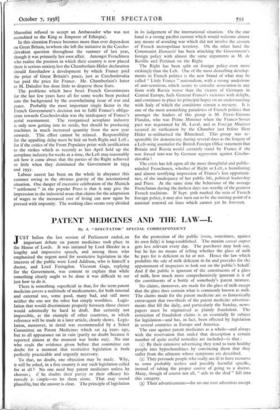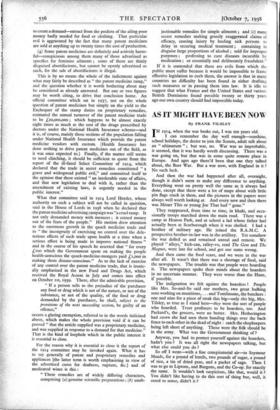PATENT MEDICINES AND THE LAW I.
By A "SPECTATOR" SPECIAL CORRESPONDENT
I UST before the last session of Parliament ended, an d important debate on patent medicines took place in the House of Lords. It was initiated by Lord Horder in a lengthy and impressive speech, and among those who emphasised the urgent need for restrictive legislation in the interests of the public were Lord Addison, who is himself a doctor, and Lord Faringdon. Viscount Gage, replying for the Government, was content to explain that while something clearly ought to be done it was difficult to see just how to do it.
There is something superficial in that, for the term patent medicine covers a multitude of medicaments, for both internal and external use, some good, many bad, and still more neither the one nor the other but simply worthless. Legis- lation that would discriminate properly between those classes would admittedly be hard to draft. But certainly not impossible, as the example of other countries, to which reference will be made in a later article, clearly shows. Legis- lation, moreover, in detail was recommended by a Select Committee on Patent Medicines which sat 24 years ago, but to all appearance sat in vain (partly no doubt because it reported almost at the moment war broke out). No one who reads the evidence given before that committee can doubt for a moment that restrictive legislation is both perfectly practicable and urgently necessary.
To that, no doubt, one objection may be made. Why, it will be asked, in a free country is any such legislation called for at all ? No one need buy patent medicines unless he chooses ; if he doubts their purity or their efficacy his remedy is simple—to let them alone. That may sound plausible, but the answer is clear. The principle of legislation for the protection of the public (even, sometimes, against its own folly) is long-established. The maxim caveat emptor gets less relevant every day. The purchaser may look out, but he has no means of telling whether the glass of milk he pays for is deficient in fat or not. Hence the law which prohibits the sale of milk deficient in fat and provides for the appointment of inspectors to look out on the public's behalf. And if the public is ignorant of the constituents of a glass of milk, how much more comprehensively ignorant is it of the constituents of a bottle of somebody's patent mixture.
No claims, moreover, are made for the glass of milk except that the glass does contain what is commonly known as milk. The claims made for the patent medicine are so fantastically extravagant that two-thirds of the patent medicine advertise- ments that fill the daily, and particularly the Sunday, news- papers must be stigmatised as plainly fraudulent. The restriction of fraudulent claims is an essentially fit subject for legislation—and has, in fact, been effected by legislation in several countries in Europe and America.
The case against patent medicines as a whole—and always with the reservation that under that description a certain number of quite useful remedies are included—is that : (t) By their extensive advertising they tend to turn healthy people into hypochondriacs by convincing them that they suffer from the ailments whose symptoms are described.
(2) They persuade people who really are ill to have recourse to some probably useless and possibly harmful specific, instead of taking the proper course of going to a doctor. Many, though of course not all, " aids to the deaf " fall into this category.
(3) Their advertisements—for no one ever advertises except to create a demand—extract from the pockets of the ailing poor money badly needed for food or clothing. That particular evil is aggravated by the fact that many patent medicines are sold at anything up to twenty times the cost of production.
(4) Some patent medicines are definitely and actively harm- ful—conspicuous among them many of those advertised as specifics for feminine ailments ; some of them are thinly disguised abortifacients, but cannot be openly advertised as such, for the sale of abortifacients is illegal.
This is by no means the whole of the indictment against what may fairly be described as " the patent medicine ramp," and the question whether it is worth bothering about may be considered as already answered. But one or two figures may be worth citing, to drive that conclusion home. An official committee which sat in 1937, not on the whole question of patent medicines but simply on the yield to the Exchequer of the stamp duties on proprietary remedies, estimated the annual turnover of the patent medicine trade to be £20,000,000 ; which happens to be almost exactly eight times as much as the cost of the drugs prescribed by doctors under the National Health Insurance scheme—and it is, of course, mainly those sections of the population falling under National Health Insurance which provide the patent medicine vendors with custom. (Health Insurance has done nothing to drive patent medicines out of the field, as it was once expected to.) Finally, if the matter still seems to need clinching, it should be sufficient to quote from the report of the ill-fated Select Committee of 1914, which declared that the trade in secret remedies constituted " a grave and widespread public evil," and committed itself to the opinion that there existed " an intolerable state of affairs, and that new legislation to deal with it, rather than the amendment of existing laws, is urgently needed in the public interest."
What that committee said in 1954 Lord Horder, whose authority on such a subject will not be called in question, said in the House of Lords in 1938 when he declared that the patent medicine advertising campaign was "a cruel ramp. It not only demanded money with menaces ; it coined money out of the fears of the people." His motion drew attention to the enormous growth in the quack medicine trade and to " the incongruity of exercising no control over the dele- terious effects of such trade upon health at a time when a serious effort is being made to improve national fitness " and in the course of his speech he asserted that " for every Lroo which the Government spent on making the people health-conscious the quack-medicine-mongers paid Li,000 in making them disease-conscious." As to the lack of exercise of any control over the patent medicine trade, that is ironic- ally emphasised in the new Food and Drugs Act, which received the Royal Assent in July and comes into effect on October 1st, 1939. There, after the admirable provision, " If a person sells to the prejudice of the purchaser any food or drug which is not of the nature, or not of the substance, or not of the quality, of the food or drug demanded by the purchaser, he shall, subject to the provisions of the next succeeding section, be guilty of an offence," occurs a glaring exemption, referred to in the words italicised above, which makes the whole provision void if it can be proved " that the article supplied was a proprietary medicine, and was supplied in response to a demand for that medicine." That is the kind of loophole which in the public interest it is essential to dose.
For the reason why it is essential to close it the report of the 1914 committee may be invoked again. What it has to say generally of patent and proprietary remedies and appliances [the latter term is worth emphasising in view of the advertised cures for deafness, rupture, &c.] and of medicated wines is this : " These remedies are of widely differing characters, comprising (a) genuine scientific preparations ; (b) unob- jectionable remedies for simple ailments ; and (c) many secret remedies making grossly exaggerated claims of efficacy, causing injury by leading sick persons to delay in securing medical treatment ; containing in disguise large proportions of alcohol ; sold for improper purposes ; professing to cure diseases incurable by medication ; or essentially and deliberately fraudulent."
If it is contended that these are evils from which the public must suffer because it would be impossible to frame effective legislation to curb them, the answer is that in many countries no difficulty has been found in either drafting such measures or in passing them into law. It is idle to suggest that what France and the United States and various British Dominions found possible twenty or thirty years ago our own country should find impossible today.















































 Previous page
Previous page